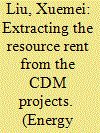|
|
|
Sort Order |
|
|
|
Items / Page
|
|
|
|
|
|
|
| Srl | Item |
| 1 |
ID:
094277


|
|
|
|
|
| Publication |
2010.
|
| Summary/Abstract |
The revenue generated from a CDM project in China will be shared by the government and the project owner, and is also subject to the corporate income tax. This paper studies the impacts of the revenue sharing policy and income tax on the CDM market. The economic model presented in this paper shows that higher-cost CDM projects will be more affected by the CDM policies than lower-cost projects. In addition, the majority of CERs will be generated from lower-cost projects. This kind of distribution of CERs across different types of CDM projects, which is in line with the current picture of the CDM market in China, is not consistent with the goal of sustainable development. A simulation shows that a type-by-type tax/fee scheme would be more effective in assisting sustainable development than the current CDM policies. The study also suggests the government use negative tax/fee with the type-by-type scheme to subsidize the CDM projects that generate large sustainability benefits but would otherwise not be developed due to high costs. If all of the revenue from the CDM is recycled, it is estimated that CERs generation will increase by 98.28 MtC, mainly from the CDM projects that have substantial sustainability benefits for the host country.
|
|
|
|
|
|
|
|
|
|
|
|
|
|
|
|
| 2 |
ID:
142042


|
|
|
|
|
| Summary/Abstract |
We study the association between natural resource rents and internal political stability, highlighting the importance of the distribution of political power as a mediating factor. We present a simple theoretical model demonstrating that increased rents are likely to be positively associated with the internal stability of a powerful incumbent while destabilizing a less powerful incumbent. Our empirical analysis confirms this prediction. Employing panel data for more than 120 countries from the period 1984–2009, our estimation results demonstrate that resource rents can promote political stability but only when political power is sufficiently concentrated. Indeed, if the incumbent is sufficiently weak, rents fuel instability. Our main results hold when we control for the effects of income, quality of institutions (rule of law, democratic accountability and corruption), persistence of political stability, time-varying common shocks, country fixed effects, possible endogeneity of rents and power balance to political stability, and various additional covariates. Our analysis departs from the existing literature by emphasizing not (only) the type of government, but rather the strength of government, as a key determinant of the impact of resource rents on political stability. This analysis sheds light on current political transformations and reconfigurations in the resource rich Middle East and North Africa.
|
|
|
|
|
|
|
|
|
|
|
|
|
|
|
|
| 3 |
ID:
142043


|
|
|
|
|
| Summary/Abstract |
We study the association between natural resource rents and internal political stability, highlighting the importance of the distribution of political power as a mediating factor. We present a simple theoretical model demonstrating that increased rents are likely to be positively associated with the internal stability of a powerful incumbent while destabilizing a less powerful incumbent. Our empirical analysis confirms this prediction. Employing panel data for more than 120 countries from the period 1984–2009, our estimation results demonstrate that resource rents can promote political stability but only when political power is sufficiently concentrated. Indeed, if the incumbent is sufficiently weak, rents fuel instability. Our main results hold when we control for the effects of income, quality of institutions (rule of law, democratic accountability and corruption), persistence of political stability, time-varying common shocks, country fixed effects, possible endogeneity of rents and power balance to political stability, and various additional covariates. Our analysis departs from the existing literature by emphasizing not (only) the type of government, but rather the strength of government, as a key determinant of the impact of resource rents on political stability. This analysis sheds light on current political transformations and reconfigurations in the resource rich Middle East and North Africa.
|
|
|
|
|
|
|
|
|
|
|
|
|
|
|
|
|
|
|
|
|